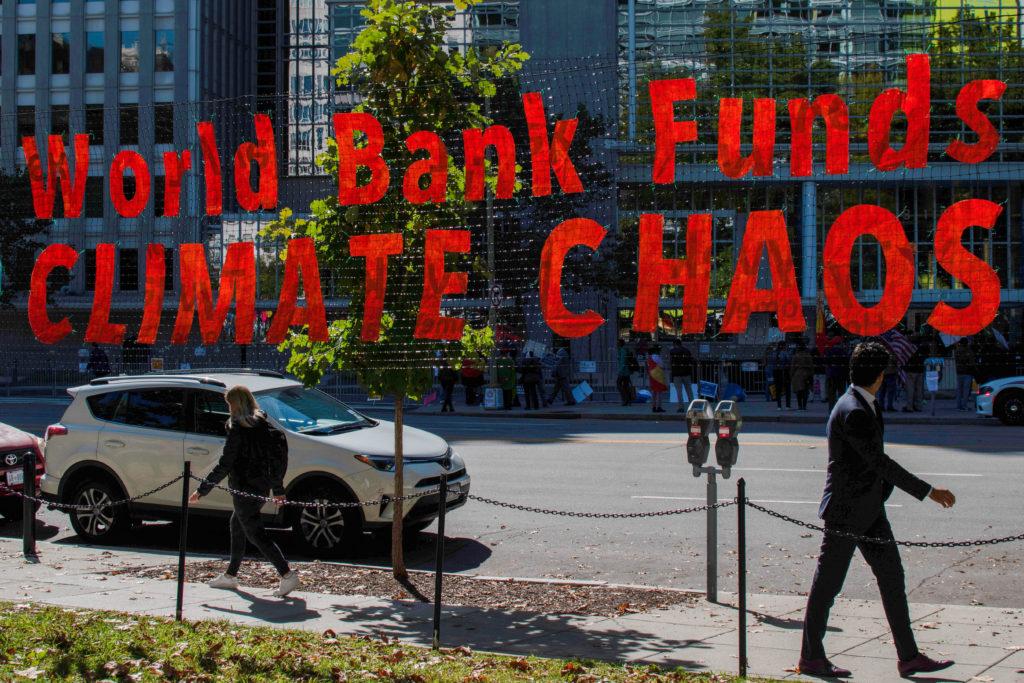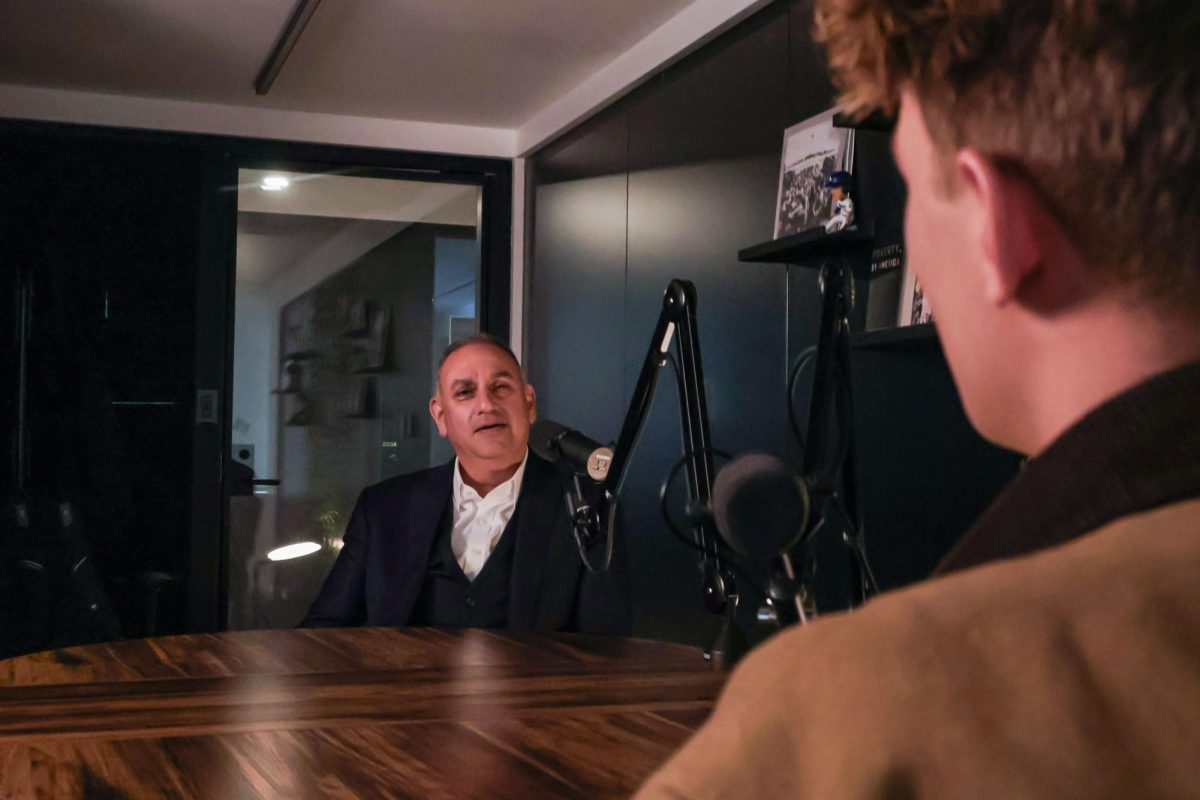More than 100 protesters gathered in front of the World Bank Friday afternoon alongside GW student groups to denounce the World Bank and International Monetary Fund’s stakes in the fossil fuel industry and demand climate action from its top officials.
The For People, For Planet protest – organized by national organizations like Big Shift Global and Debt for Climate – gathered in Edward R. Murrow Park Friday morning before marching across Pennsylvania Avenue and through campus, chanting against alleged climate inaction from top government officials like World Bank President David Malpass. GW student groups like Students Against Imperialism, Sunrise GW and GW Dissenters participated in the joint calls for action following a week of organized teach-ins to educate students about the IMF and World Bank’s alleged hand in the climate crisis and art-builds to prepare signs and banners for Friday’s protest.
The World Bank and the IMF, both headquartered in Foggy Bottom, are organizations dedicated to eradicating poverty globally through economic policies and financial assistance. The week’s actions aimed to draw government officials’ attention during last week’s 2022 Annual Meetings of the IMF and the World Bank held in Foggy Bottom, which brought together international officials to discuss global issues like poverty eradication, economic development and global aid.
[gwh_image id=”1172738″ credit=”Florence Shen | Photographer” align=”none” size=”embedded-img”][/gwh_image]
The week of action follows calls to acknowledge Malpass as a “climate denier” after he refused to comment on his beliefs regarding human impact on greenhouse gas emissions, saying “I’m not a scientist.” Big Shift Global also reported earlier this month that the World Bank has provided nearly $15 billion to fossil fuel projects following the 2015 Paris Agreement after promising to withdraw funding from oil and gas extraction projects in 2017.
Rachel Lin, a junior and the co-chair of GW Students Against Imperialism, said she worked as a part of the For People, For Planet coalition’s as part of the logistics crew organizing food donations and securing permits for the week’s actions. She said she also worked to relay information about the week’s actions from the coalition to other GW student groups like Sunrise GW and GW Dissenters to organize their members to protest.
She said SAI also hosted teach-ins to educate students on the histories of the World Bank and the IMF and art-builds, which offered a space for students to create banner and signs for the week’s actions.
“I think many GW students want to attend protests and other political actions but worry about going alone, so at the most basic level, our teach-in and art-build provided a safe group that students could join,” Lin said in an email.
Lin said other student groups, like Students for Justice in Palestine and Jewish Voice for Peace, helped raise awareness for the protest among their own members throughout the week, ultimately boosting participation during the week’s protests.
“Last week truly demonstrated to me that coalition grassroots organizing is so important in any activist movement,” Lin said.
Pada Schaffner, a junior and a hub coordinator for Sunrise GW, said he joined Friday’s protest to call for an end to financial institutions like the World Bank continuously funding fossil fuel projects and policies, which he says put Indigenous communities at risk.
“Major financial institutions like the IMF and the World Bank have a lot of power backed by currency,” Schaffner said. “As such, they have a role to play in fighting the climate crisis.”
[gwh_image id=”1172737″ credit=”Florence Shen | Photographer” align=”none” size=”embedded-img”][/gwh_image]
Aza Evans-Townsend, a junior and a member of Sunrise’s War Room committee responsible for planning the organization’s future actions, said despite Sunrise GW’s focus on calling for University divestment from the fossil fuel industry within the scope of the GW community, it’s important for student activists to show solidarity for local causes and protests in the D.C. community.
She said Sunrise GW was able to collaborate and forge new relationships with GW student groups through this week of action by supplying resources like paint, rope and tarps for a Students Against Imperialism “art-build,” where they created banners and cornhole boards leading up to Friday’s action. She said Sunrise GW hopes to partner with the groups during the upcoming semester to draft a joint letter to interim University President Mark Wrighton demanding transparency regarding officials’ promise to divest from fossil fuels.
“We just know that we want to work together to build a coalition of organizations that are dedicated to getting funding transparency,” Evans-Townsend said.
Jelina Liu, a senior and a co-founder of the anti-war student movement GW Dissenters, said she participated in a bike blockade Wednesday night outside a World Bank and IMF dinner that stopped traffic on 23rd Street and a noise demonstration on Thursday to interrupt the G-20 finance ministers press conference with cowbells and musical instruments.
“We’re just letting the world know that we’re not going to go down without a fight,” Liu said.
Liu said she hopes World Bank and IMF officials cancel the debt of developing countries in the Global South who have accepted loans in exchange for adopting regulations benefiting the fossil fuel industry through fossil fuel subsidies. She said she hopes more GW students attend future protests to inform themselves about the current state of the climate crisis and participate in solidarity with other student movements on campus through future protests and calls for action.
“There’s always going to be someone who benefits from the fossil fuel industry, and you have all these other world powers to deal with,” Liu said. “So hopefully, people get more involved actually on the streets and actually pressuring people in power instead of thinking that if they get a position of power that they’re going to be able to use that for good.”
Aby Frierson, a political science major at American University, said she was protesting the existence of the World Bank and their use of fossil fuels for their own money and profit. Frierson said she was extremely happy about the large turnout at both the march and the Festival of Resistance earlier that day, saying the more people making noise, the better.
“The fact that we’re all getting together instead of just leaving it up to the single organizations here to organize, that really just says enough, because usually it’s so not divided but just independent.” Frierson said. “But today, it’s really nice to all depend on one another and hopefully that trend continues because the more in numbers, the more our voice is heard.”
Frierson said they hope to see the dissolution of the World Bank in the future and were marching that day in order to bring awareness to the communities being affected by the Bank’s use of fossil fuels. They said they hope the march will destabilize the bank and lead to more advocacy for renewable energy sources.
“I hope people know that although we’re doing things peacefully, the actual overthrow of the bank is not going to be a peaceful movement because they haven’t been peaceful with us,” Frierson said.








